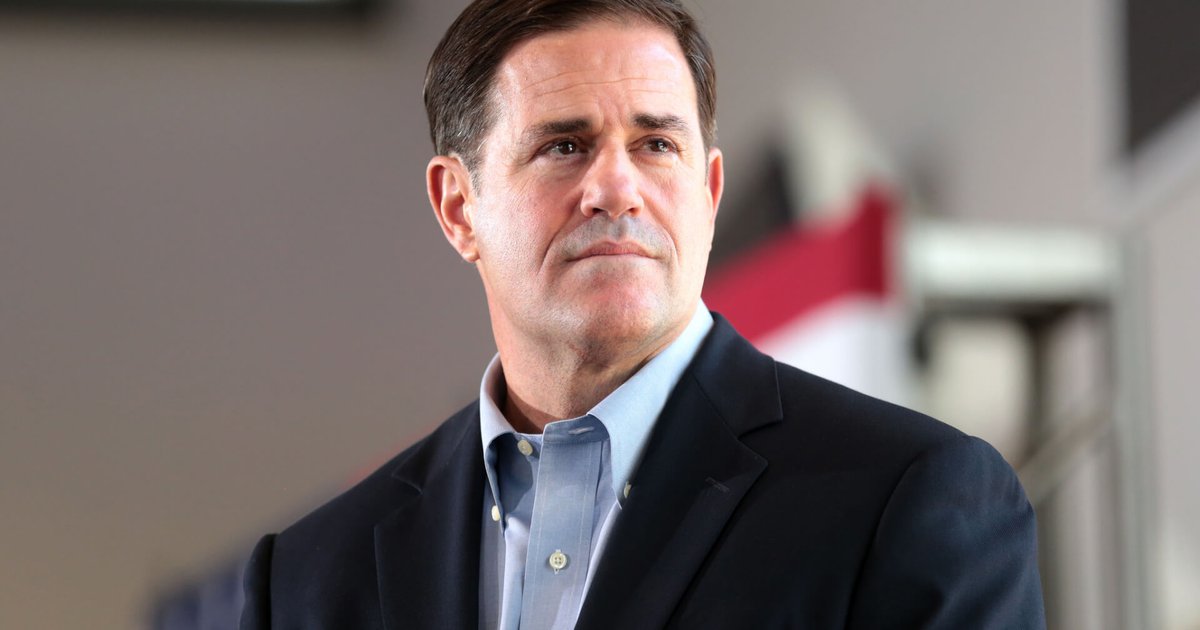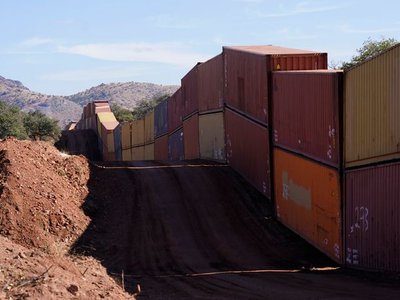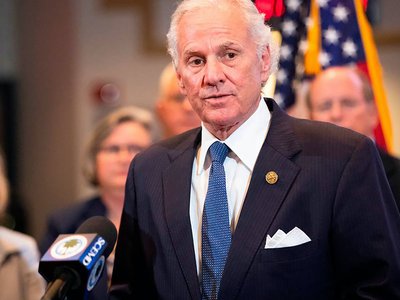Term-limited Arizona Republican Gov. Doug Ducey leaves office this year after a six-year run during which he balanced the state budget, shrunk the state government, cut taxes, and deregulated the economy, becoming a favorite of fiscal conservatives. But, like many governors, his last several years in office have been rocked by the COVID-19 pandemic.
Ducey was rumored to be considering a 2022 Senate run but recently announced he will not pursue the office. He sat down with the Washington Examiner to discuss his time in office, navigating the pandemic, and his political future.
The following transcript has been lightly edited and condensed.
Washington Examiner: Economic analysis has shown that Arizona is one of 10 states that has now recovered all the jobs lost since the pandemic downturn. What do you credit for that turnaround and success?
Gov. Doug Ducey: Well, first, I want to say we were booming before the pandemic. In my first year, I came into office, and we had a billion-dollar deficit and a sluggish economy. So, the first thing we did was make difficult decisions and tighten our belts. And we actually shrank the size of our government in terms of spending, which very rarely happens at any level in government.
We focused on economic development. I ran on kick-starting an economy. I came from the private sector, Cold Stone Creamery was my business. So, from 2015 until 2020, our economy was growing. We were bringing successful economic development wins to Arizona.
I said in my second State of the State [speech] that I’d be remiss if I didn’t thank Arizona’s partner in growing our economy — and that was then-California Gov. Jerry Brown. We just have seen an exodus of people and producers from the state of California that have been coming into our state.
[We were also] getting wins, like [big investments in Arizona from] Lucid Motors, Intel, Taiwan Semiconductor, Nikola, TuSimple, etc. Those types of businesses … time after time, chose Arizona.
When the pandemic came, we took a very targeted and balanced approach that protected lives, livelihoods, and protected individual liberties. So we were never shut down. There was never a lockdown in our state. We prioritized people’s lives and then allowed the economy to breathe.
WEX: One of the controversial, at least in some quarters, calls you made during that recovery was to cut off the flow of federal unemployment benefit supplements that were disincentivizing labor and offering some people more on benefits than they could make by going back to work.
Ducey: Well, I didn’t see it as a controversial decision. We, in Arizona, are not going to pay people to not work and stay home when there are jobs available.
So, we took those dollars and repurposed them to [give] bonus[es] for people to come back to work full-time, and even bonus[es] for people to come back to work part-time. Understanding incentives, the economy, and coming from the private sector, I knew that this would help individuals get back on their feet in the economy.
WEX: Last year, you signed into law the biggest income tax cut in Arizona history. Do you think that has factored into your economic success? And would you have done that regardless of the pandemic?
Ducey: Well, we’ve lowered or simplified taxes every year I’ve been in office. I ran on a platform of getting the income tax as close to zero as possible. Yet my first year, as I said, we had a $1 billion deficit in a sluggish economy. So, I knew that to get the income tax cut that I wanted, we were going to have to have a growing economy, a balanced budget, and a plan. And it would take two terms.
So, as we got to this point, coming into 2020, we had the largest [budget] surplus in state history. We already had a billion-dollar balance in our rainy day fund. And with that much additional funds in our general fund, while putting record investment into K-12 education and our social safety net, I thought that our taxpayers deserved a break. We were able to get a $2 billion tax cut …
And in addition to that, in that same session, we paid off $2 billion of debt. So, our state is fiscally healthy, very sound, and growing.
WEX: Can you talk about the steps you’ve taken to shrink the government itself?
Ducey: So, that’s part of what I ran on. I had built a business, [next] I wanted to shrink a government and grow an economy.
I think the government, almost everywhere you look, is bloated and unaccountable. So, we’ve worked very hard to get our arms around this government to make sure that we’ve got a mission in place for each of our agencies, metrics that they can measure themselves against, and transparency around the money.
I didn’t, of course, want to fire anyone, especially [without] cause. But, through our diligence during the campaign, we learned that 24% of the state’s workforce was eligible for retirement in that first four years. So, just by putting a hiring freeze [in place], through attrition, we were able to shrink the size of [the state] government. [We did that while] we added people to the Department of Public Safety and added people to Children’s Services and the social safety net.
Where we actually made up for too many people working inside government is through technology, and by reducing the size of the bureaucracy and the administrative state.
The good news is that there are 400,000 additional jobs since we started in 2015. So, anybody that’s left the government and actually wants to find a higher-paying job can do that in the private sector. So, our government is smaller, more effective, and more efficient.
But the [population] is larger, and the economy is even larger still. So, [we have] lots of opportunities for folks. They’re not trapped in a job, and finally, they have some leverage on wages. That’s because the economy is growing, and it’s such a competitive environment.
WEX: Arizona became the first state in the nation to recognize out-of-state occupational licenses in 2019. And you’ve also really deregulated telehealth services. How did these policy areas get on your radar? And why did you make them a priority?
Ducey: These are two of the things I’m most proud of, [because] we became an exporter of good policy in Arizona.
We started with occupational licensing reform for military spouses. I think everybody knows that military families move about every 18 months. And we heard there was a tremendous pressure on these families, and actually families breaking up with a trailing spouse, because they couldn’t find work when they had to move every year.
So, we [started by recognizing out-of-state licenses] for military spouses. It worked very well. And we said, if this is working for military spouses, with Arizona being one of the No. 1 net in-migration states in the nation, why are we putting people through hoops that are coming here from other places when they’ve already proven to their [home state’s] government that they have the education, the certification, the background that they need?
It was a bit of a different dynamic on telehealth. Of course, that [deregulation] was [in] response to the pandemic. People had situations with their children, they couldn’t travel, and they needed to get in front of good doctors.
And we heard so many success stories from parents who were thankful their children could get medical care without ever having to get in the car and travel from Tucson to Phoenix Children’s Hospital. We thought this was an innovation that we could expand … for all of our citizens.
[Virtual healthcare] keeps the waiting rooms less crowded and busy, and, of course, there’s going to be less transmission of COVID-19, or any virus, in those situations. And it also frees up our physicians for seeing the people that are actually in need, versus someone that just needs amoxicillin or has a common strain of the cold or flu.
WEX: What was it like being governor during this emergency?
Ducey: Of course, I did not anticipate it, but you do sign up for the [possibility of a] crisis [or] emergency when you win this responsibility as governor.
I feel very blessed that I have an excellent senior staff. I had an incredible director of our Department of Health Services in Cara Christ, and I was in my second term. So, we [had already] been through wildfires. And of course, we had experienced some civil unrest in the streets. But this was completely different.
In my role as the chairman of the Republican Governors Association, and a member of the National Governors Association, governors are very collegial, and we did many conference calls. We got governors from both blue states and red states to share best practices, share principles, and findings that they had.
And I think very much of Charlie Baker in Massachusetts, who’s a great governor and a wonderful friend. The Eastern Seaboard was really going through this first. I didn’t know anyone in Arizona that had COVID-19 in the February, March, and April [2020] time frame.
But [we were] listening to Charlie about what was happening in Boston, and other places out East. We were able to prepare in Arizona to make sure our citizens were up to speed on what to expect and then to deal with it from a hospital capacity standpoint, an ICU standpoint, and also a potential crisis standpoint. So, I think all of that went into [our] actions around the pandemic.
WEX: On a very serious note, we’re coming up on a million Americans overall who have died from COVID-19. And, from everything I’ve seen — the rankings are a little different depending on different data sources — Arizona has ended up ranking pretty highly on COVID-19 deaths relative to population, in the top five out of all 50 states.
Why is that? What went wrong?
Ducey: So, of course, we grieve every death in Arizona, and we did everything we could to prioritize lives, along with livelihoods and protecting individual liberty.
I think there are a number of reasons that you would look at these statistics and see differentiation among the states. Of course, Arizona has two major metropolitan areas in Maricopa County and Greater Phoenix. It’s a county of over 4.4 million people, along with our retirement communities and elderly folks that are here.
Dr. Richard Carmona, who was a former surgeon general of the United States and is leading the vaccine effort for Arizona, spoke on how Arizona handled COVID-19. And I’m going to refer to what he wrote about our state, pointing out the anomalies and situations in Arizona around how we handled the pandemic. But I do believe we set the right priorities for our state and made the best possible decisions in real time, given the changing circumstances of the pandemic.
WEX: A little bit earlier in our conversation, you talked about lockdowns and the balance between liberty and public health. And you said that there were no real lockdowns in Arizona.
But you did issue a stay-at-home order for one month in March of 2020. And you later extended that through May 15.
Ducey: It’s not a lockdown. It’s not a lockdown.
There was a fog of pandemic, we weren’t really sure who was most vulnerable. And we were working with the federal administration on this idea of what was originally asked of “15 days to slow the spread.” So, working in concert with them, we put out a "stay home, stay connected, stay healthy" message, and people listened. So, it was a way to do that. But it was not a lockdown.
WEX: What differentiates it from the lockdowns they did in other states?
Ducey: Well, it was just that it was a communication to people so that we could better understand the virus. People were very responsive to it. And, traffic really did slow in our state.
[For context, the governor issued an executive order on March 30, 2020, titled “Stay Home, Stay Healthy, Stay Connected.” It ordered that Arizonans “may leave their place of residence only for Essential Activities, to participate in or receive Essential Governmental Functions, or to participate in or fulfill Essential Functions outlined in” a previous executive order.
The order specifically said that residents “shall be notified and given an opportunity to comply” “prior to any enforcement action being taken to enforce this order.” It was not voluntary.
The governor amended and extended this order again on April 29, 2020, renewing it until May 15, 2020.
When I asked the governor’s office about this in a follow-up email, I received the following response:
“The ‘Stay Home, Stay Healthy, Stay Connected’ executive order was a directive to encourage people to physically distance and protect lives and livelihoods. State statute allowed the government to issue this directive which prevented cities, towns, and counties from preemptively creating harsher measures where actual lockdowns could have taken place. This directive allowed Arizona to remain open.
"No one was arrested because this was a guideline for personal responsibility. It was promoting staying healthy without requiring direct orders.
"When you look at the executive order, you see more of what Arizonans could do versus couldn’t do. You could enjoy outdoor exercise such as walking, hiking, running, biking and golfing. You could conduct work or volunteer. You could get groceries, go to church, see a doctor, care for a family member. That is not a lockdown.”]
WEX: Would you do that differently if you had to do it again?
Ducey: Of course we [would] redo things differently. I think once we understood that the most vulnerable in our state were those 65 and older with an underlying health condition, that guided a lot of the decision-making along the way.
But today, we’re looking [back] with a pandemic, hopefully, largely behind us. So yes, I think you can say that you would do things differently.
WEX: Between yourself and others you’ve mentioned, like Charlie Baker in Massachusetts, Larry Hogan in Maryland, and now, where I live in Virginia, Glenn Youngkin, what do you think the recipe for success is to be a popular Republican governor in a blue or purple state?
Ducey: Well, first, I want to challenge the narrative that we’re a purple state. I believe [Arizona is] still a red state. I think that’ll be proven out in November of 2022.
In my 2018 race, which was a tough cycle for Republicans, we won by a larger margin than we did in 2014. And it was by 14 points.
But I think [the winning] message is that you’re going to be governor of all the people. It’s addressing the real kitchen table issues that governors have to deal with, like balancing the budget, like looking at the differentiation of different states’ economies.
There’s really no silver lining from COVID. I wish none of us had to deal with it. But our public has seen a real contrast from red states to blue states. You can see the opportunity and economic growth, along with these economic [development] gems that are being won in red states.
And then also the focus on education. I think parents had a real awakening and what was happening with their kids during COVID-19, the lack of rigor and expectation that they saw over remote learning.
And, mostly in Republican states, [but especially in] Arizona, where we’re the No. 1 state in the nation on school choice, I think that [the school choice] message is something that resonates with parents, folks in communities who want to climb the economic ladder. You need a growing economy to do that.
And parents care about what their kids are learning in school. Not only do Republicans want to hold those schools accountable for the dollars they spend, but they want to bring innovations to education as well.
WEX: Arizona has clearly got a little bit of a political maverick culture — you had John McCain, and now, you’ve got Democratic Sen. Kyrsten Sinema, who has split with her party at times and is a very unique and eccentric figure. What is it about Arizona?
Ducey: I do think Arizona is a very independently minded state. We are the youngest or newest state in the lower 48 states. We’ve been [part of the United States] just for 110 years. And [more than] 70% of the adults in Arizona were born somewhere else, they moved here for a better quality of life and to live their version of the American dream. So, they definitely think for themselves.
Of course, you mentioned John McCain. But before Sen. McCain was Sen. Barry Goldwater. And I think that Western pioneering spirit is what typifies the spirit of Arizona.
WEX: Now, you recently made the decision not to run for the Senate. Why?
Ducey: I didn’t want to be a senator.
WEX: You didn’t want to be on TV all day?
Ducey: Well, I love being a governor. This is the job I wanted. You get to set the vision, chart the course, pick the people, and you get a scorecard. Some days, you eat the bear, other days, the bear eats you. I’m an executive by personality and trait. I want us to have a good Republican conservative senator.
WEX: Did the open rebuke from former President Donald Trump influence your decision not to run?
Ducey: No, I didn’t want to be a senator.






